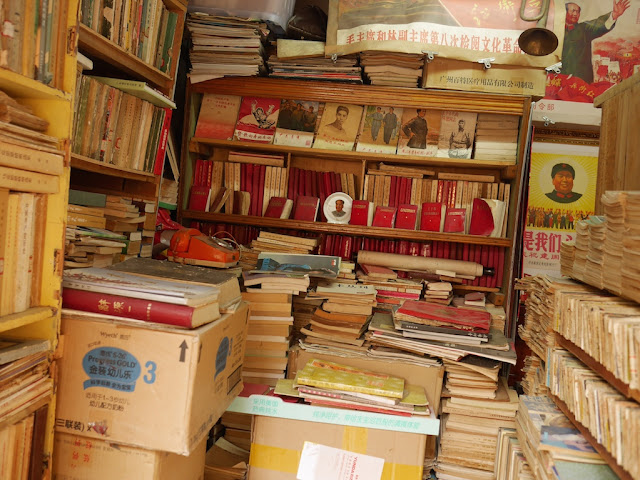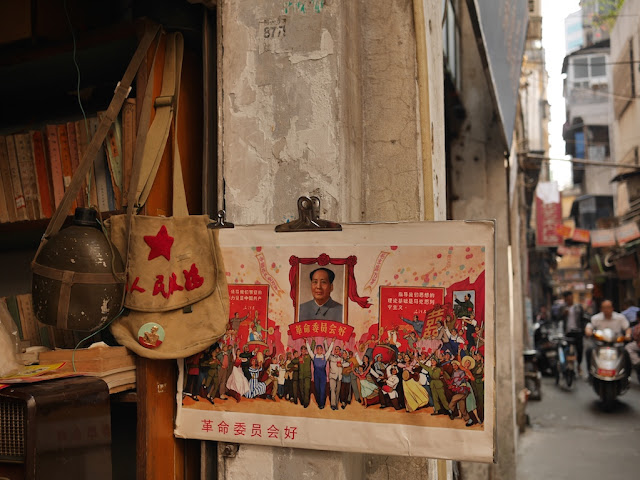Wuya Lane (吾牙巷) between Wenhua Street and Fuxing Road in Shaoguan is home to a variety of establishments including places selling & buying old currency and other collector's items, a restaurant specializing in donkey meat, inexpensive hair salons, and "hair salons" which appear to offer services far more intimate than a haircut. The place which most caught my eye there has the Chinese name 怀旧书屋 (Huáijiù Shūwū). Since no English name is listed, I will take the liberty of calling it The Nostalgia Book Room.
Numerous older books, posters, electronics and other memorabilia fill the small store. Many of them are connected to China's Cultural Revolution. Despite all of the upheaval and terror it brought, many in China today look back fondly on those days or part of what they held.
Chinese author Yu Hua, who grew up during the Cultural Revolution, sees some of the nostalgia for the Cultural Revolution as a sign of people's discontent with today's China:
Below is a closer look at the store. Some photographs were taken just after it opened and before all of the items had been set up as desired. If you wish to visit*, as far as I can tell the store opens when it opens. In other words, it is best to call Mr. Fan (范先生) at 0751-6109085 or 8979819 or you might be out of luck.
*Some online maps identify Wuya Lane as a street (吾牙街), but store signs and standard address plates in the area identify it as a lane / alley (吾牙巷).
Numerous older books, posters, electronics and other memorabilia fill the small store. Many of them are connected to China's Cultural Revolution. Despite all of the upheaval and terror it brought, many in China today look back fondly on those days or part of what they held.
Chinese author Yu Hua, who grew up during the Cultural Revolution, sees some of the nostalgia for the Cultural Revolution as a sign of people's discontent with today's China:
In today’s China, more and more people speak in positive terms about the Cultural Revolution and hanker for a return to that era. Most of them don’t really want to turn the clock back: It’s mainly their dissatisfaction with current realities that fuels their interest in revolution. The itch for revolution, of course, may have different triggers. Some people are alienated by the increasing materialism of Chinese society, but many more are outraged by the emergence of interest cliques that marry political power to business profits.But a quote of a Chinese musician in German sinologist Barbara Mittler's "Popular Propaganda? Art and Culture in Revolutionary China" suggests how people can have positive feelings about the era's culture without connecting it to any specific political message:
My generation likes the model works; they are our youth. Yes, there are people who dislike them, too, but really we do like them. Indeed, when I was young, eighteen or so, I needed art so much, we all did. And then there were just the model works as our food, and we actually thought they were quite great. Jiang Qing [Mao’s wife, who was in charge of the production of model works] used really good performers, writers, artists, and musicians. Of course this was propaganda for Mao’s thoughts, but it was also simply good art, it is all against these imperialists and their attacks, yes, it is, but it is also good art, really.These are just two perspectives out of many on a complex topic which has generated much research and discussion — part of why I found the The Nostalgia Book Room so fascinating. Another part is simply the history. And old books and electronics . . .
Below is a closer look at the store. Some photographs were taken just after it opened and before all of the items had been set up as desired. If you wish to visit*, as far as I can tell the store opens when it opens. In other words, it is best to call Mr. Fan (范先生) at 0751-6109085 or 8979819 or you might be out of luck.
*Some online maps identify Wuya Lane as a street (吾牙街), but store signs and standard address plates in the area identify it as a lane / alley (吾牙巷).











Lovely photos. I adore old book shops like this. Nothing better than picking up a vintage 连环画 then going right next door for a 洗发水 ;)
ReplyDeleteThanks. I actually wondered how often something like that happens.
Delete